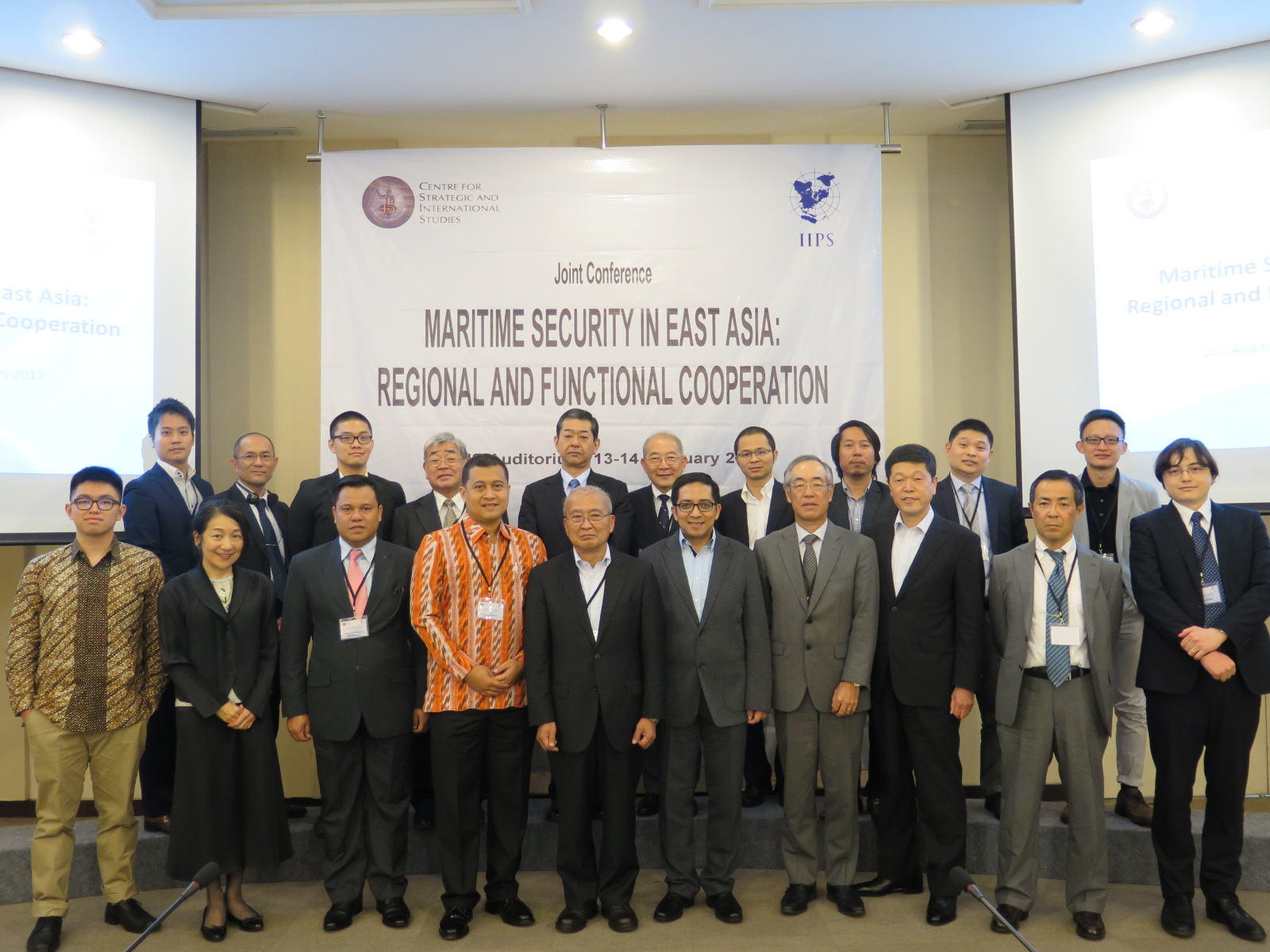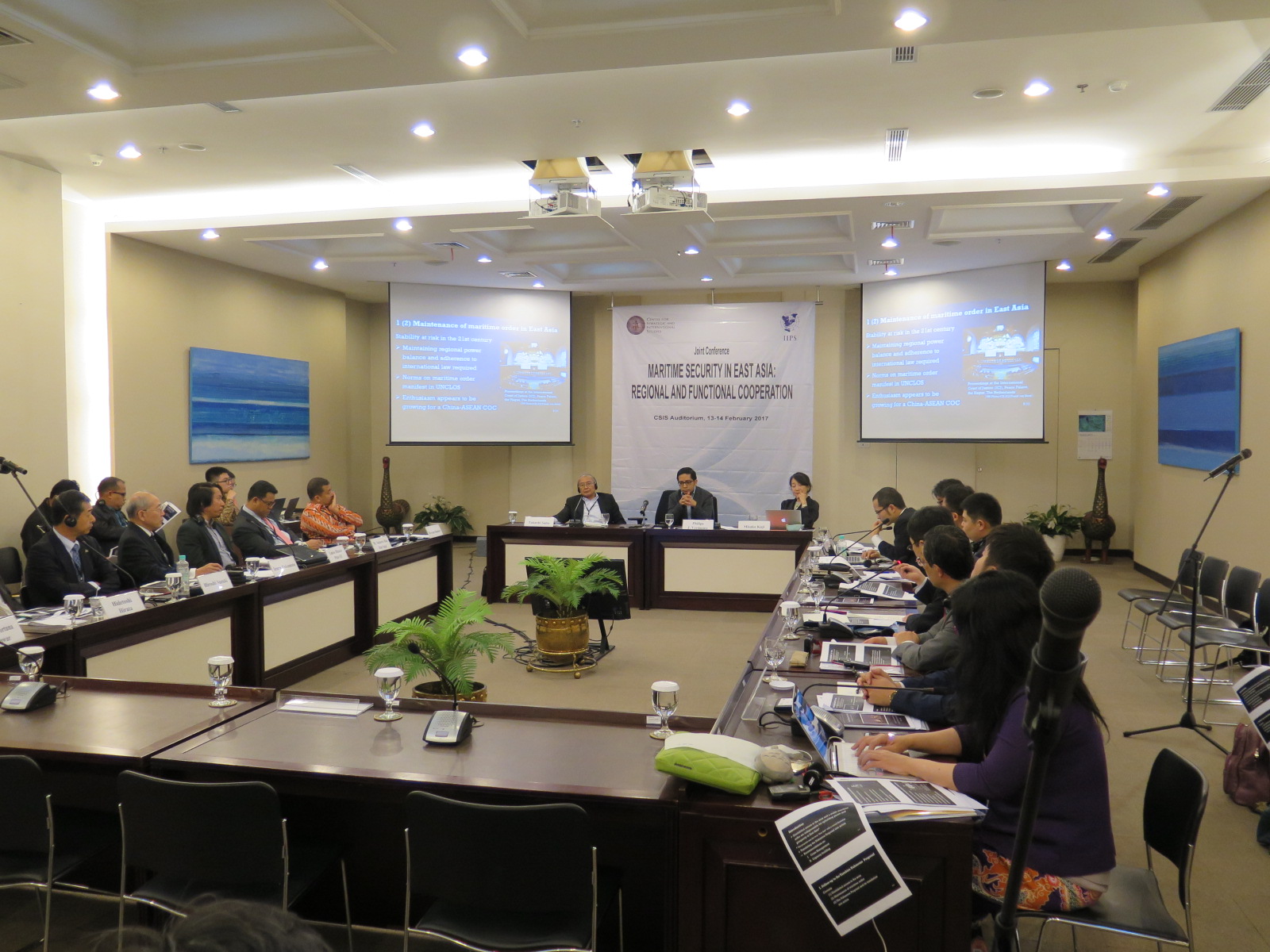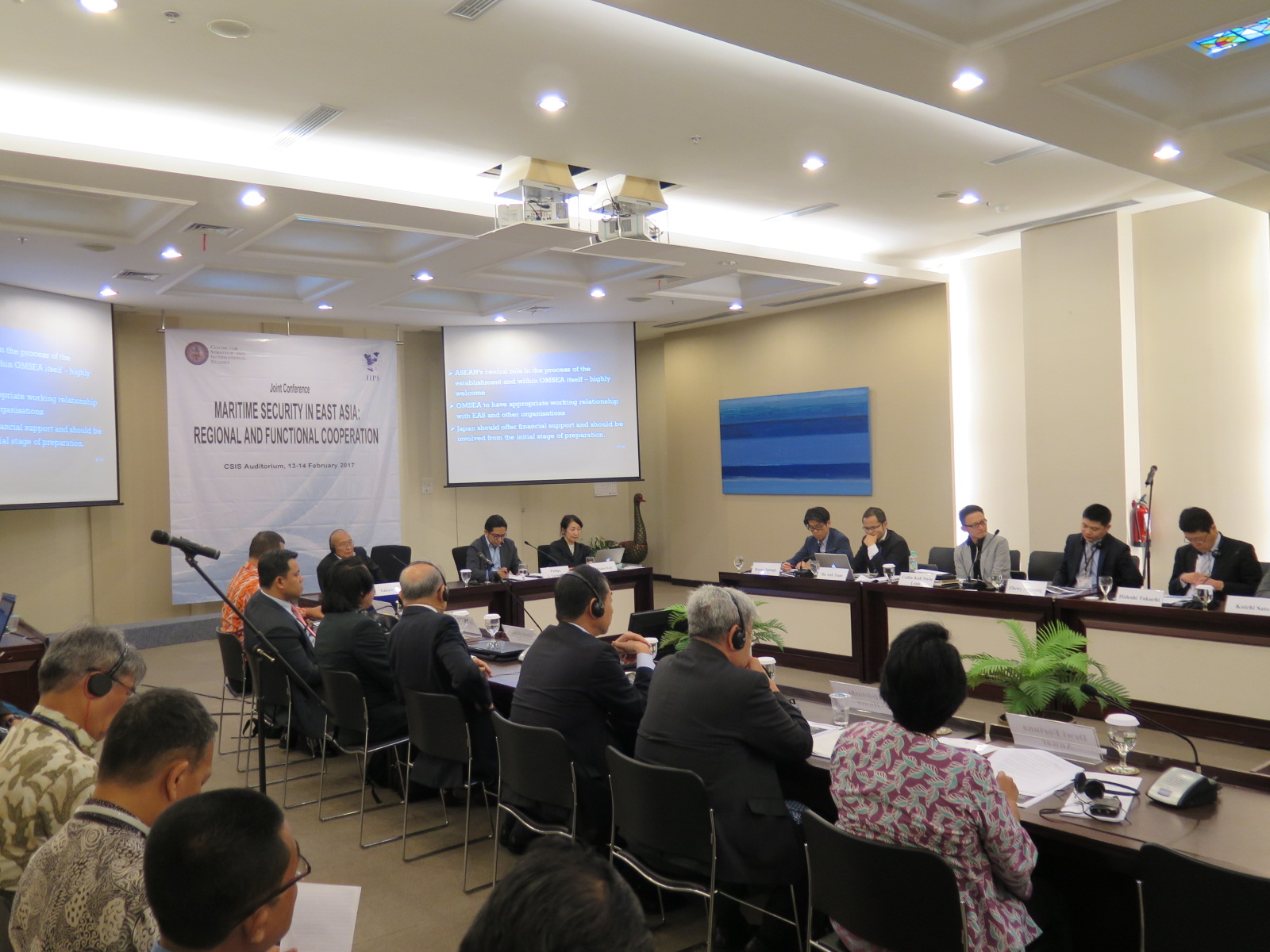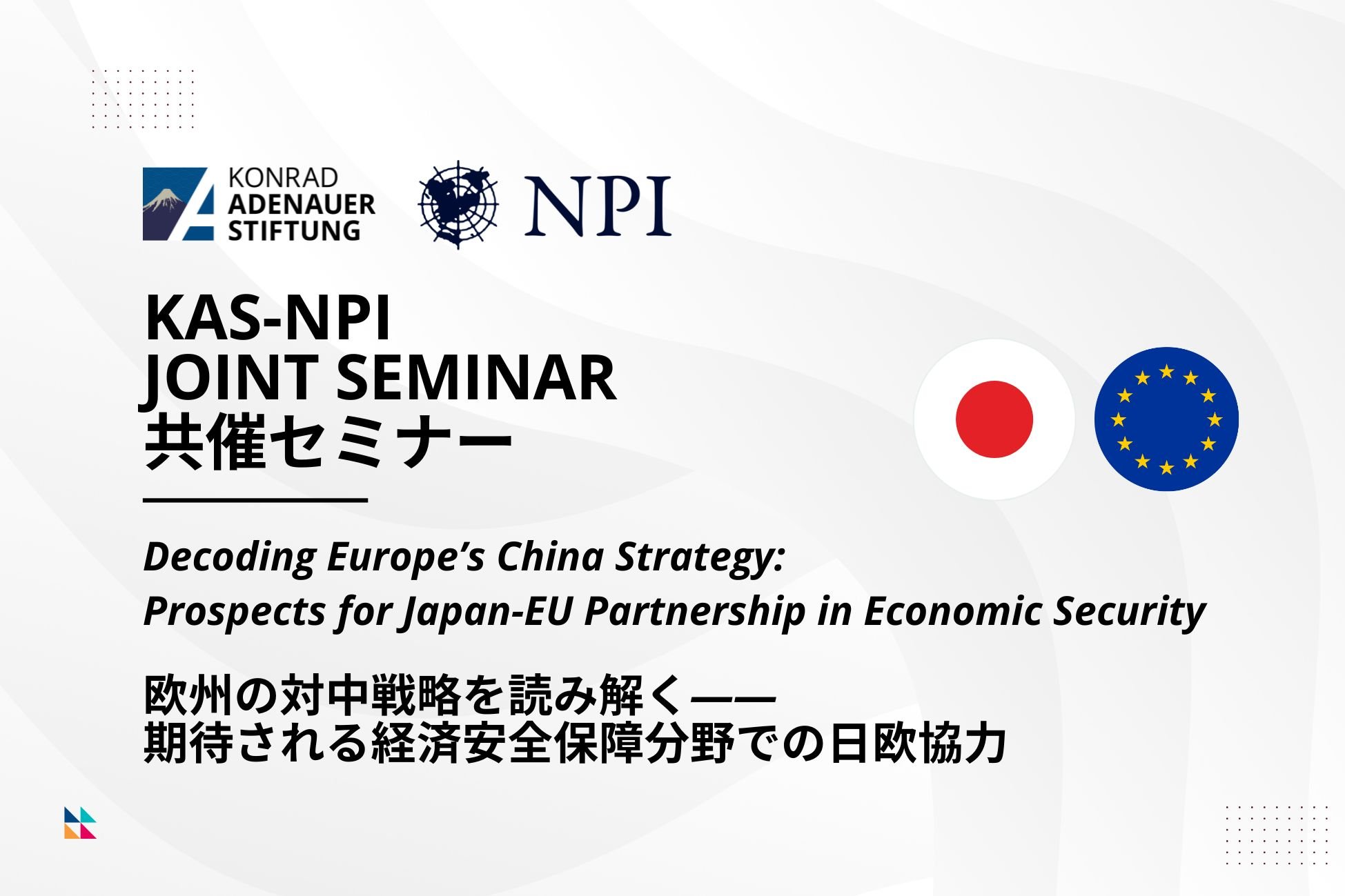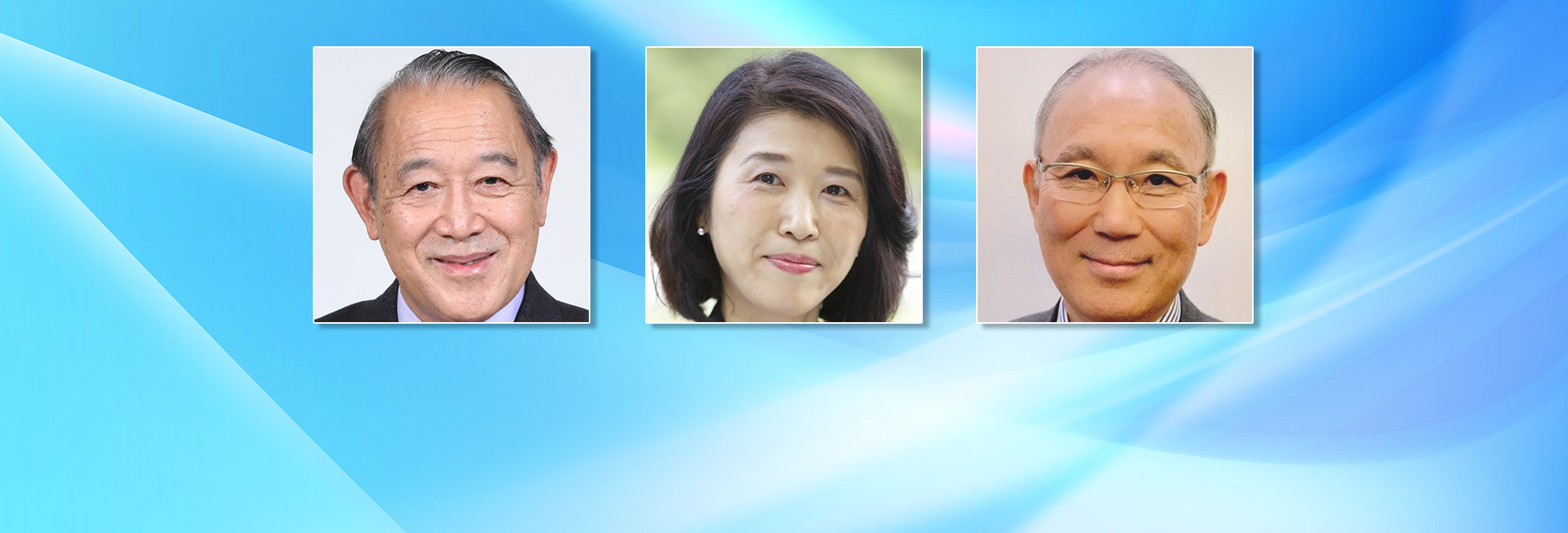2017/03/23
International Conference in Jakarta, "Maritime Security in East Asia: Regional and Functional Cooperation" (Co-organized by IIPS and CSIS Indonesia)
1. Date
13-14 February 2017
2. Place
CSIS Auditorium, Jakarta, Indonesia
3. Background
In March 2016, IIPS formed a Study Group on Maritime Security in East Asia consisting of former high-level officers and officials of the Japanese Self-Defense Forces, Ministry of Defense and Coast Guard, as well as a senior academic. The purpose was to consider ways to translate into action the "Yasuhiro Nakasone Proposal on Maritime Security in East Asia", announced in December 2015. The Study Group completed a Report entitled: "Crisis Management at Sea: Urgent Proposals from the field by IIPS Study Group to follow up on The Yasuhiro Nakasone Proposal on Maritime Security in East Asia", and on 28 October 2016, organized a symposium in Tokyo to discuss the report with the participation of four Japanese senior experts. Under the climate of heightening tensions in the South China Sea, aiming to further exchange views with overseas experts, IIPS, together with CSIS, the leading think tank in Indonesia, organized an international conference in Jakarta. As it was held in the year of the 50th anniversary of the formation of ASEAN, the conference was attended and supported by the Mission of Japan to ASEAN, symbolizing Japan-ASEAN cooperation.
4. Main Participants
(1) IIPS Study Group on Maritime Security in East Asia:
Head of Study Group: Takashi Saito, Admiral (ret), former Chief of Staff, Joint Staff of Japan Self-Defense Forces (Conference Co-Chair)
Deputy Head: Izuru Fukumoto, Vice Admiral (ret), former President, Japan Maritime Self-Defense Force Command and Staff College
Koichi Sato, Professor, J. F. Oberlin University, Tokyo
Hiroshi Suzuki, former Vice Commandant for Operations, Japan Coast Guard
Hideshi Tokuchi, former Vice-Minister of Defense for International Affairs
Hidetoshi Hirata, Lieutenant General (ret), former Commander, Air Training Command, Japan Air Self -Defense Force
(2) CSIS Indonesia
Philips J. Vermonte, Executive Director, CSIS (Conference Co-Chair)
(3) Guest Speakers
Kresno Buntoro, Head of Law of the Sea, Indonesian Navy
Collin Koh Swee Lean, Research Fellow, S. Rajaratnam School of International Studies, Nanyang Technological University, Singapore
Lucio Blanco Pitlo III, Lecturer, Chinese Studies Program, Ateneo de Manila University
Mohamad Soharto Bin Mat Said, Principal Assistant Director, Enforcement and Exercise Branch, Malaysian Maritime Law Enforcement Agency
Ha Anh Tuan, Director, Maritime Policy at the East Sea Studies Institute, Diplomatic Academy of Vietnam
Zheng Anguang, Associate Professor, Nanjing University, China
(4) Conference Participants
A. Mission of Japan to ASEAN
H.E. Kazuo Sunaga, Ambassador of Japan to ASEAN
Ryo Nakamura, Minister, Embassy of Japan to Indonesia
Yukiko Okano, Minister-counsellor, Mission of Japan to ASEAN
B. Indonesian Government, academia
H.E. Arif Havas Oegroseno, Deputy I on Maritime Sovereignty, Coordinating Ministry of Maritime Affairs and Resources (Keynote Speaker)
Dewi Fortuna Anwar, Deputy Secretary for Politics to the Vice President
Ali A.Wibisono, Lecturer, University of Indonesia
C. Jakarta based diplomatic corps
H.E. Suh Jeong In, Ambassador of the ROK to ASEAN
Embassies of Australia, China and Italy
(5) Organisers
CSIS: Rocky Intan, Andrew Mantong
IIPS: Misako Kaji, Hiroshi Takayama, Akira Okubo
5. Summary of the Open Session Proceedings
(1) Keynote Speech (by Amb. Arif Havas Oegroseno)
Ambassador Havas's speech started by giving an overview of the region in uncertainty with such phenomena as the rise of China, the possibility of a shift in US foreign and security policy due to the inauguration of the Trump administration, and Russian naval exercises. The strategic importance of Southeast Asia is revealed by the competing initiatives such as the Chinese belt and road initiative, the AIIB (Asian Infrastructure Investment Bank), Indonesia's regional initiatives, and Japan's "Free and Open Indo-Pacific Strategy". He further remarked that to "settle" the South China Sea question could not be hoped for but stressed the importance of regional States work together to "manage" crises.
Furthermore, in terms of regional challenges, Ambassador Havas shed light not only on security but also the gradual contamination of the seas due to disposal of plastic and the destruction of the ecosystem which he called a "slow-motion catastrophe", and called upon the need for States to cooperate in the field of maritime security. Regarding security, he stated that the positive effect of CUES is limited, and that means through confidence building measures ought to be considered.
Regarding the ways in which to respond to challenges, he stressed the importance of ASEAN to be in the driving seat, and stated that he believed ASEAN should de-escalate and balance the confrontation between the US and China, and bring them to a more cooperative relationship. He further stated that States should cooperate to tackle issues such as climate change, environmental protection, and food security by coordinating to develop concrete proposals and show initiative. He stressed that functional cooperation is essential so that discussions in Track 1, Track 1.5 and Track 2 levels can all be supported at the governmental level.
(2) Open Session 1 (chaired by Admiral Saito)
Mr. Hideshi Tokuchi, member of the IIPS Study Group, delivered a presentation on the Study Group's Report as in Closed Session 3, and supplementary comments were given from Study Group members.
(2)-1
Mr. Tokuchi delivered a presentation explaining the main features of the Study Group's Report: "Crisis Management at Sea: Urgent Proposals from the field by IIPS Study Group to follow up on The Yasuhiro Nakasone Proposal on Maritime Security in East Asia". The Report places crisis management and capacity building in the field of maritime security as the two main pillars of its recommendations, and proposes to establish an Organization for Maritime Security in East Asia (OMSEA), a permanent forum for regional actors to exchange views and information regarding maritime security and pursue multilateral cooperation.
Pressing issues regarding maritime security today can be summarized in the following five points:
1. Ensuring legitimate law enforcement and crisis management: Due to cases such as excessively violent law enforcement operations by vessels vis-à-vis private vessels and insufficient communication between MLEAs (Maritime law enforcement agencies), it is important to create a crisis management framework by promoting a common understanding on code of conduct, establishing a communication mechanism among MLEAs, and conducting other confidence-building measures.
2. Framework to avoid incidents in airspace: As there is no law enforcement agency in airspace and the law is enforced by military aircraft, there is a higher risk of incidents to occur.
3. MLEA capacity-building: For appropriate law enforcement, there are rules that must be observed such as International Law and principle of proportionality, and education is key to make such principles a common rule. Moreover, there is a need to ensure a common system of communication among MLEAs. MLEAs will be able to play a "buffer" role to prevent escalation of conflicts by enhancing their operational capacity.
4. Strengthening Maritime situational awareness (MSA) and international cooperation: It is important for each State to share a common MSA. A common MSA will contribute not only to crisis management but also to human security, in such activities as disaster relief, environmental protection, and safe and sustainable fishery.
5. Relationship between MLEAs and navies: There is a need to clarify the relationship between MLEAs and navies, which differ in mission and mandate, so that MLEAs can fulfill their "buffer" role.
Based on the points above, the IIPS Study Group made the following two recommendations:
Recommendation I: Crisis Management
1. Upholding the principle of proportionality: In dealing with private vessels, MLEAs must exercise law enforcement in a manner under the principle of proportionally in order to achieve their objective, so that law enforcement does not become excessively violent. ASEAN States are currently updating law enforcement guidelines for MLEAs. Such efforts should continue.
2. Securing communications system among MLEAs: Since CUES (Code for Unplanned Encounters at Sea) is unsuitable for MLEAs, and cases have been observed in which MLEAs conduct inappropriate law enforcement, there is need for a system of communications among MLEA vessels on the scene. Such a system would contribute in avoiding misunderstandings.
3. Concluding INCSEA (Agreement on the Prevention of Incidents on and over the High Seas) for military vessels and aircraft: CUES for navies has so far been sufficiently functioning. Since it does not apply to all aircrafts and is legally non-binding, binding agreements on the prevention of incidents which apply to airspace above international waters ought to be concluded. Japan and the US should take the initiative on such an agreement with China to set a precedent for this region.
4. Exchanging information on fishing vessels operated by maritime militias: Maritime militias operate fishing vessels under instructions from the State authorities, and operate as quasi-military or quasi-MLEA vessels. Yet their details remain unclear. Maritime militias fall into several categories that make it difficult to deal with, hence States operating maritime militias should disclose the details concerning their activities. Other States should exchange information and collaborate to deal with the problem of maritime militias.
Recommendation II: Capacity-Building
1. MLEA capacity-building: MLEAs' capacity-building ought to receive higher priority than that of the military. System of communications, hardware assets upgrade, legal education, communication between MLEA and military are important agendas.
2. Common understanding of International Law: As a precondition for the formation of international order, the development of a common understanding of International Law is vital.
3. Enhancing MSA: The crash of Malaysia Airlines flight MH 370 in March 2014 highlights the need for MSA in airspace. Until a multilateral organization such as OMSEA becomes fully functional, Japan and the United States, those who possess the willingness and capabilities, should duly take the lead in promoting coordination and integration among existing international frameworks. This process should not be entrusted to governments and international organizations only but the private sector should also be reached out. Bilateral and multilateral coordination is called for, and existing fora including the ADMM+ (The Expanded ASEAN Defence Ministers' Meeting) should be utilized. In this context, common security issues beyond maritime security such as disaster relief, should also be taken into consideration.
Measures on the part of Japan under above recommendations are the following five points. They are already under implementation.
1. Whole-of-government approach: JSDF (Japan Self-Defense Forces) and JCG (Japan Coast Guard) capabilities/expertise should be shared within the Government of Japan; the MOD (Ministry of Defense) capacity building cooperation should be well coordinated with the ODA (official development assistance) by MOFA (Ministry of Foreign Affairs).
2. Easing restrictions on capacity-building assistance: The Japanese Diet may deliberate on a legal framework to enable assistance without compensation by recipient States, in the current session.
3. Cooperation by JCG: JCG and GRIPS (the National Graduate Institute for Policy Studies) run a master's-level course "Maritime Safety and Security Policy Program" for young executive MLEA personnel from Asian States is a case in point.
4. Assistance by MOD and JSDF: Japan should pursue not only bilateral cooperation with each ASEAN State, but also multilateral cooperation, as the underwater medicine cooperation program with Vietnam, conducted as part of the trilateral cooperation among Japan, the US and Australia.
5. Effective use of human resources
In considering the formation of a multilateral organization for maritime security in East Asia, it is important to uphold the concept of ASEAN centrality by utilizing existing fora such as EAS (East Asia Summit), ARF (ASEAN regional forum) and ADMM+. The Government of Japan should offer support to this process and should be involved from the initial stage of preparation.
(2)-2
To supplement the above presentation, Professor Sato proposed the formation of an information sharing center in ASEAN to deal with skirmishes at sea, an idea shared also by the Ministry of Foreign Affairs of Japan, as a means to support ASEAN and Chinese efforts in the field of maritime security.
Vice Admiral (ret) Hiroshi Suzuki stated that the most important factors for MLEAs are: 1. humanitarian concerns, which is at the basis of saving lives, the mission of MLEAs, 2. respect of International Law at law enforcement, and 3. the principle of proportionality. The principle of proportionality should also contribute to preventing escalation of conflicts over maritime interests. Vice Admiral (ret) Suzuki introduced HACGAM (Heads of Asian Coast Guard Agencies Meeting) as a forum for MLEAs to cooperate among each other and touched upon its merits.
(3) Open Session 2 (chaired by Dr. Vermonte)
The Study Group's report received comments from the closed session participants, followed by exchanges among a wider audience of roughly 50 participants in total, including the intellectuals, the members of the diplomatic corps and the press stationed in Jakarta. The whole-of-government approach proposed and practiced by Japan attracted much attention. Indonesian experts drew examples from the present state of Indonesia, in which maritime security falls under jurisdictions of several branches of the government including the BAKAMLA, the Ministry of Fisheries and the Coast Guard, and since all these organizations have their own needs that require capacity building, and pointed to the difficulty to effectively match the assistance from States and institutions. Furthermore, Indonesian participants made proposals on formulating guidelines on law enforcement by MLEAs. Comments were also made as to the question of who to lead such initiatives, reflecting the sensitive concern on the question of ASEAN centrality when considering regional initiatives originated by States outside ASEAN. Many participants found it valuable for members of a wider maritime community to continue exchanging views in such venues as the present Conference. The Japanese participants pointed out anew to the need to share information on the actual situation MLEAs face as well as their activities. Furthermore, the IIPS Study Group shed light upon a potential framework for information sharing which utilizes AIS (Automatic identification system), drawing lessons from initiatives in the Baltic Sea. Participants agreed that there was a need to further consider ways in which to develop MSA (Maritime Situational Awareness), including seeking cooperation from the private sector. Chairman Saito concluded the Conference by expressing his wish for continuous engagement through Track 2 and Track 1.5 consultations.


